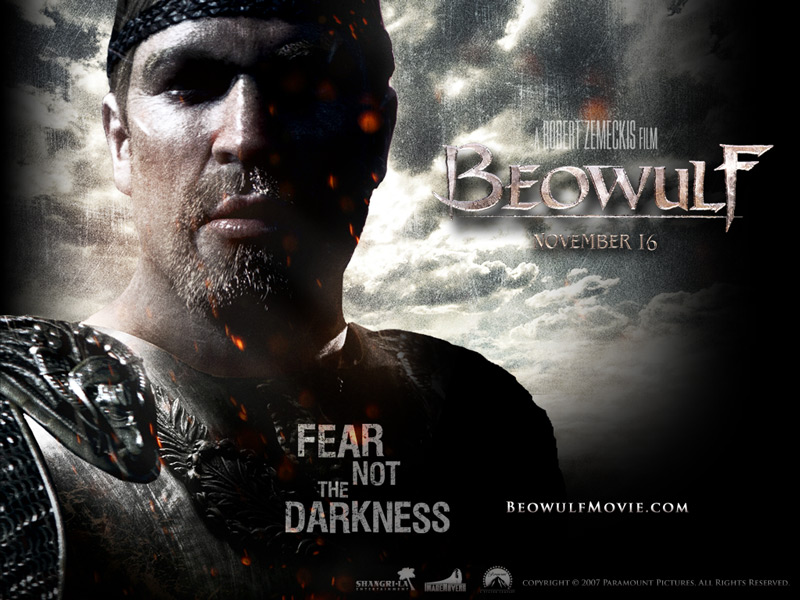
Last night I finally took Amy to see Stardust, one of my favorite films this year. I’d seen the trailer for the new Beowulf movie before, but for some reason last night I really started thinking about it for the first time.
I taught Beowulf to high school freshmen for many years, and have a great love and respect for the story (or else I would not have taught it). So when Anthony Hopkins, Angelina Jolie, and some guy who looks like Brad Pitt but isn’t are all cast, the “blockbuster” alarms start to go off. We all know what damage “blockbuster” movies can do to a good story. And casting Angelina Jolie as a “sexy” Grendel’s mother certainly indicates an intention to change the plot somewhat.
Nevertheless, after the trailer dialogue was over, and the hard-rock music kicked in over slow motion flashes of arrows raining down…a warrior leaping through the air with upraised sword…a dragon striking out… I couldn’t help it. My heart skipped a beat, and I dared to be excited.
The fact that Neil Gaiman — who also wrote Stardust, American Gods, Anansi Boys — is credited for the screenplay does give some reassurance that even if it isn’t very true to the original, it will be a deep and well-written script. And perhaps “sticking to the original” is overrated, too.
That’s because the greatest ancient stories — like Beowulf, the Arthurian legend, and the Illiad — transcend their bards, and become the property of everyone. They are the original open-source / folk literature. They are retold in every generation, and each retelling reveals more about the generation in which it is told than the one in which it was originally written. Tolkien was a great reteller of the story of Beowulf: its characters, plots, landscapes, and culture were the inspiration for Middle Earth and many stories, including Lord of the Rings. But Tolkien’s themes were those that spoke to an England ravaged by two World Wars, longing for a return to the hobbit-like simplicity of more rustic times.
The latest slew of Arthurian films all obsess over the connections between King Arthur and the fall of the Roman Empire at the hands of terrorists (barbarians) — No surprise, when our American Empire is threatened, and we’re looking for a hero/savior.
The tagline for the new Beowulf movie, according to IMDB, is simple: “Pride is the curse.” I wonder if this is perhaps a timely message for an American culture that, like the heroes of the original epic, are relentlessly driven by ambition, wealth, fame, and power. We can defeat our monsters — our Grendels and our Saddam Housseins, our Hitlers and our Dragons — but what if the truer, darker evil lives entirely within ourselves?
Ok, forget about all that. Really it’s just all about the swords.

2 Responses to Beowulf Movie